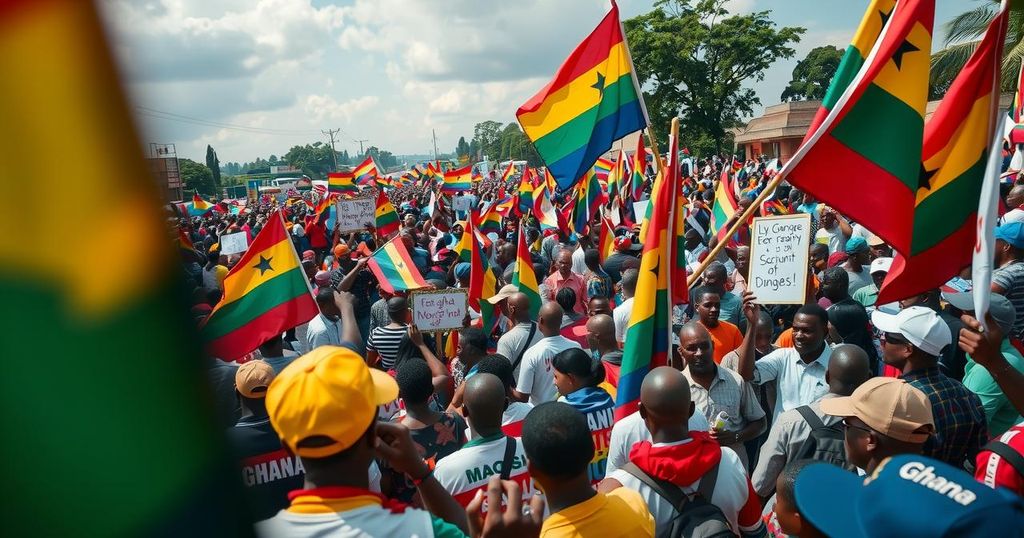As Ghana approaches its general elections, the LGBTQ+ community confronts dire choices with candidates intensifying anti-LGBTQ+ rhetoric. The ruling party, led by Mahamudu Bawumia, pledges to sign legislation imposing severe penalties on LGBTQ+ individuals. As public support for the bill escalates, advocates warn of increasing violence and discrimination, raising alarm about the safety and rights of the LGBTQ+ community amidst the electoral process.
In anticipation of the upcoming general elections on December 7, Ghana’s LGBTQ+ community faces significant challenges as leading presidential candidates pledge to intensify anti-LGBTQ+ sentiment. The next president will likely need to address a bill passed by parliament that imposes severe penalties on individuals identifying as LGBTQ+, potentially including imprisonment. Mahamudu Bawumia, the ruling party’s candidate, has publicly committed to signing the bill, while his primary opponent, John Dramani Mahama, calls for stricter legislation against LGBTQ+ activities without expressly stating his stance on the bill itself.
The tension surrounding this issue is compounded by existing laws criminalizing homosexual acts in Ghana, with the proposed legislation threatening to deepen discrimination against sexual and gender minorities. With sentences extending to five years in prison for same-sex activities and penalizing both advocacy and those who provide support to LGBTQ+ individuals, the bill risks exacerbating an already hostile environment. One member of the LGBTQ+ community, Abena, expressed concerns about belonging and safety, emphasizing the stressful atmosphere created by political leaders leveraging anti-LGBTQ+ rhetoric to gain support.
The societal climate has shifted since the bill’s introduction in 2021, with a significant rise in anti-LGBTQ+ sentiment, as evidenced by a survey indicating that only 7% of Ghana’s population is tolerant of same-sex relationships. Religious groups, denouncing homosexuality as contrary to Ghanaian morals, organized street protests advocating for the bill’s passage, reflecting a public psyche that has grown hostile towards LGBTQ+ rights. As the election approaches, the competition between political parties to present themselves as more vehemently against LGBTQ+ rights poses serious risks for community members.
Further, advocates warn that if the bill is enacted, the repercussions may lead to significant discrimination, increased violence, and further marginalization of LGBTQ+ individuals. The EU has condemned the bill, noting its incompatibility with Ghana’s constitutional commitments and the potential for a loss of international funding should it be enacted. The Supreme Court’s impending decision regarding the bill’s constitutionality on December 18 may provide some hope but arrives too late for community members needing to make electoral choices amidst political turmoil. Abena lamented the lack of safety for individuals like herself, stating, “I feel the country isn’t safe for people like me if the first, second and third options are all using the LGBT bill to score more points.”
As the elections draw near, the fate of Ghana’s LGBTQ+ community hangs in the balance, caught between the aspirations of candidates leveraging anti-LGBTQ+ sentiment and the imminent legislative changes that threaten their rights and safety.
In Ghana, the socio-political landscape surrounding LGBTQ+ rights has become increasingly volatile, particularly as political leaders in the run-up to elections leverage anti-LGBTQ+ sentiment to rally support. The country’s existing legal framework already criminalizes gay sex, and a proposed bill includes harsher penalties while broadening the definitions of illegal activities related to sexual and gender minorities. This atmosphere of intolerance is heightened by societal attitudes rooted in conservative religious ideologies, further complicating the prospects for LGBTQ+ individuals in the electoral context.
The upcoming elections in Ghana exemplify a critical juncture for the LGBTQ+ community, as political candidates capitalize on anti-LGBTQ+ sentiment to garner votes. The proposed legislation poses severe risks, potentially increasing discrimination and violence against LGBTQ+ individuals. Despite international condemnation and legal challenges, the ultimate decision points toward a climate of increasing hostility, raising grave concerns regarding the future safety and rights of sexual and gender minorities in Ghana.
Original Source: www.voanews.com






